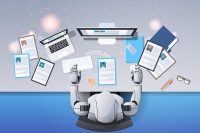Category: Technology
It’s hard to talk HR at all today without talking HR Technology. From your ATS to your HRIS we’ve got all of your tech acronyms covered in this category.
In a knowledge-based economy, companies upgrade their “capital” not by overhauling outdated machinery but by upskilling their workforce. That’s because human capital is increasingly the most important asset companies possess. And while humans aren’t as static as machinery, they still need to be retooled and upgraded.
Technological improvements have long been a source of concern for laborers in an increasingly advanced economy. As automation improves, there is an understandable fear that machines, computers, and improved processes can render certain categories of human labor obsolete.
Ernest Hemingway’s character Mike in The Sun Also Rises quipped that profound and seemingly inexorable change occurs “gradually, then suddenly.”
Is the jobseeker ready for technology in the hiring process? Innovative recruiting technologies have gained fast technological advancement in recent years, with recruiting automation playing a pivotal role. Their ability to complete daily administrative duties fast and efficiently have made them a definite desirable for hiring teams dealing with high-volume recruitment.
Before the impact of COVID-19, many employers were not prepared for or equipped to conduct video interviews for their job candidates because it wasn’t a necessity. Remarkably, many made the switch nearly overnight and now have incorporated this practice into their hiring routine.
Technologies like artificial intelligence (AI), augmented reality (AR) and virtual reality (VR), and sophisticated analytics are offering training and development professionals new opportunities for delivering personalized training that continues to incorporate methods known to improve the learner experience, according to CompTIA’s “Workforce and Learning Trends 2020” report.
For both job candidates and recruiting professionals, the hiring process can be an exercise in extreme patience and coordination. This is especially true in the early stages of the hiring process, when an often large volume of candidates must be initially prescreened and assessed through a preliminary interview.
There have always been gatekeepers in the job application process. Applicants might be afraid that a résumé screener sitting at a desk will discard their application because of an errant typo. Or, jobseekers in the first round of an interview with a company may feel like the HR recruiter just doesn’t seem to like them.
As diagnosed cases of the coronavirus increase globally, “social distancing” and “flattening the curve” have entered the common lexicon—and earned hashtag status in the United States. Many companies are doing their part to support government directives by encouraging employees to work from home.
Organizations frequently saturate their app ecosystems with collaboration tools because they allow employees to create a space for the sharing of ideas and opinions in the workplace and participate in work-based conversations using their mobile devices.










